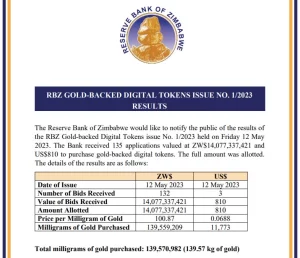
Zimbabwe sells gold-backed crypto tokens
Despite a warning from the International Monetary Fund, the Reserve Bank of Zimbabwe has sold 14 billion Zimbabwean dollars’ worth of gold-backed digital tokens, equivalent to approximately $39 million.
The Zimbabwean central bank announced on May 12 that it had received 135 requests totaling 14,07 billion Zimbabwean dollars to purchase the gold-backed cryptocurrency.
According to XE.com, the official exchange rate for the Zimbabwean dollar is 362 Zimbabwean dollars to one United States dollar, but the street rate is much higher, making the stash nominally worth approximately $38.9 million.
The April-introduced crypto tokens are backed by 139.57 kilograms of gold, with the sale taking place from May 8 to May 12.

The minimum prices for the tokens were $10 for individuals and $5,000 for corporations and other entities.
The tokens have a minimum vesting period of 180 days and can be stored in e-gold wallets or on e-gold cards.
The move is reportedly part of an effort to stabilize the country’s economy and the local currency’s continued depreciation against the dollar.
There will be a second round of sales of digital tokens, and the bank has requested that applications be submitted this week to be settled by May 18.
According to local media, RBZ Governor Dr. John Mangudya stated that:
“The issuance of the gold-backed digital tokens is meant to expand the value-preserving instruments available in the economy and enhance divisibility of the investment instruments and widen their access and usage by the public.”
The move was in response to a warning from the International Monetary Fund against the African nation’s plan for a gold-backed currency, arguing that it should instead liberalize its foreign exchange market.
An IMF spokesperson told Bloomberg, “A careful evaluation should be conducted to ensure that the benefits of this measure outweigh the costs and potential risks, such as macroeconomic and financial stability risks, legal and operational risks, governance risks, and the cost of forgone FX reserves.”
Zimbabwe has struggled with currency volatility and inflation for more than ten years. Following a period of hyperinflation that rendered the national currency worthless, the country adopted the US dollar in 2009.
To revitalize the local economy, the Zimbabwe dollar was reintroduced in 2019, but volatility ensued once again.
